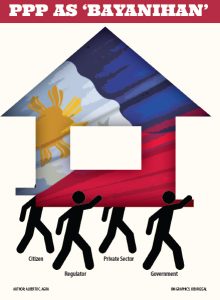‘Responsive-ility’ and responsibility Public-Private Partnership (PPP) arrangements—whether for water, reclamation, power, mass transport systems and…
PPP is “Bayanihan”
PPP is “Bayanihan”
Is  relevant to public-private partnerships (PPPs)? Are the objectives of bayanihan and PPPs the same? For PPPs to succeed, what in the spirit and practice of bayanihan can be used? What can we learn from examples of bayanihan? Who is the bayan (country) and bayani (hero) in PPPs?
relevant to public-private partnerships (PPPs)? Are the objectives of bayanihan and PPPs the same? For PPPs to succeed, what in the spirit and practice of bayanihan can be used? What can we learn from examples of bayanihan? Who is the bayan (country) and bayani (hero) in PPPs?
Typical images of bayanihan show neighbors carrying a nipa (thatched roof) hut, a chain of people passing on buckets of water to douse a fire, or passengers pushing a jeepney out of a flooded street. Bayanihan “Filipinizes” and localizes PPP. It is a Filipino word that means “cooperative undertaking” and “collective participation.” Bayanihan encapsulates PPP in two respects, i.e., as bayan-ihan and bayani-han. Both depict a story, a journey and a purpose, and demonstrate participative leadership.
Bayanihan, as a tradition and practice, demonstrates togetherness and we-ness for a purpose. One person cannot transfer a shanty, put out a house fire or push a vehicle. He or she must work with others. Every mover acts like a partner having a stake or particular role.
Each party is motivated by a common vision and moved by shared values. They must trust the other, follow certain rules, assume certain risks, complete the task and reap the benefits from the activity. Achieving a noble purpose is at the heart of bayanihan.
These are also at the core of PPPs. The “true north” of PPP is the bayan, i.e., the country, the people, the general welfare. The shanty is the “load” or the project being lifted by the four stakeholders—public proponent, private proponent, civil-society organizations and regulatory agencies.
Under a PPP, there is collective responsibility and strength that will bring about the shift from status quo to real change, and better quality of life—or the movement of the shanty, buckets of water and jeepney from point A
to point B.
The bayan is ours to shape and protect. Our lives must become better. All stakeholders must work together, journey together on the path laid out, learn together, innovate together, act as stewards together, trust each other, so that the general welfare, our own welfare, will be “future-proofed” by PPPs, and other developmental engagements and partnership strategies. Bayan-ihan underlines the purpose.
Bayani-han, on the other hand, emphasizes the load-bearers. We are partners. We carry each other’s load. We are all responsible. We are all accountable. We all lead and follow. We all carry the burden. But we must also gain. In a PPP and bayanihan, we must, therefore, co-own, co-operate, co-fund, co-design, co-evaluate, co-develop, co-communicate, co-sell, co-support and co-think.
We are the heroes (bayani) in our country (bayan). We are all heroes serving the interest of other heroes. We should not sit idly by and watch from the sidelines. We are all summoned to practice heroic leadership. Lifting from Lowney, “We are all leaders, and we are all leading all the time.” The challenge is to do it well and with magis, “self-awareness, ingenuity, love and heroism.”
Borrowing from the inaugural speech of President Duterte but making the responsibility a collective one, “[We are] here because [we] love [our] country, and [we] love the people of the Philippines.” This is bayanihan.
